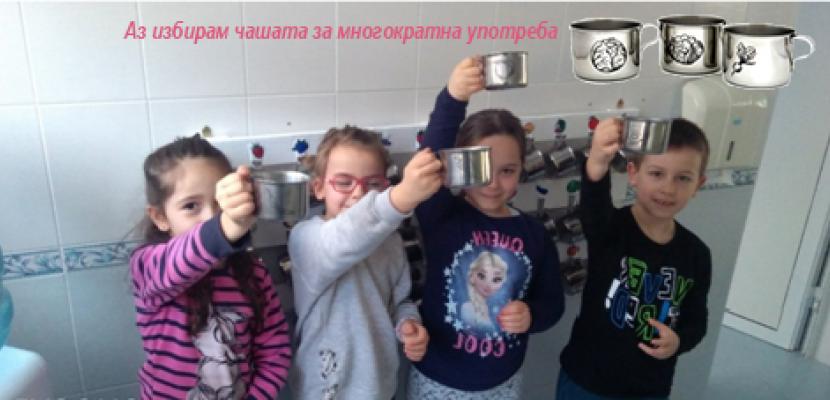
Mission "I choose the reusable cup"

About this good practice
In most public kindergartens in Bulgaria, disposable plastic cups are used for providing drinking water to children. Every day in the 1894 kindergartens in the country every child (for a total of about 225 thousand children) uses an average of 5 single-use plastic cups. As a result a plastic waste of more than 1 million cups is generated per day or a total waste weight of more than 550 tonnes per year.
Single-use plastics items are a major source of plastic leakage into the environment, as they can be difficult to recycle, are often used away from home and littered. In a sub-optimal waste management system such as the one in Bulgaria even plastic waste is collected it can find its way into the environment.
Public Environment Center for Sustainable Development - PECSD introduced a “personal cup” system where a child is given a cup carrying a unique symbol. Because the cup is “personal, individual and unique” it abides by the state regulations, meets the strict hygiene requirements as it can be sterilized at 160°C degrees. Instead of learning to dispose plastic cup after using it, kids already learn how to put the cup in place, be responsible and caring about the environment. In addition the introduction of the reusable cup system turned made the water-corner a clean, colourful and attractive area for the children.
The main stakeholders are the Local Authorities managing the 1894 kindergartens of Bulgaria, hosting 225 th kids.
Expert opinion
Resources needed
The realisation of the project is in collaboration with a private company ZERA Ltd. The private company is responsible for the production, branding, selling and donation from profit for campaign support. The PECSD is involved in the elaboration of the concept and networking with public authorities.
Evidence of success
More than 40 kindergartens and over 2000 children are involved in the initiative by the end of 2021.
As a result 2 000 000 disposal cups did not go to landfill, 7 tones non recyclable plastic and 20 ones CO2 emission saved, 10 tones natural resources used for plastic cups production saved.
Potential for learning or transfer
Curbing plastic waste and pollution is a complex problem, given its diffuse nature and the link with social trends and individual behaviour. There is no clear incentive for consumers and producers to switch to solutions that would generate less waste or litter. The GP can be used as an example on how to facilitate this link.
Growing plastic waste generation and its leakage into our environment must be tackled if we are to achieve a truly circular lifecycle for plastics.
Further information
Good practice owner
You can contact the good practice owner below for more detailed information.
